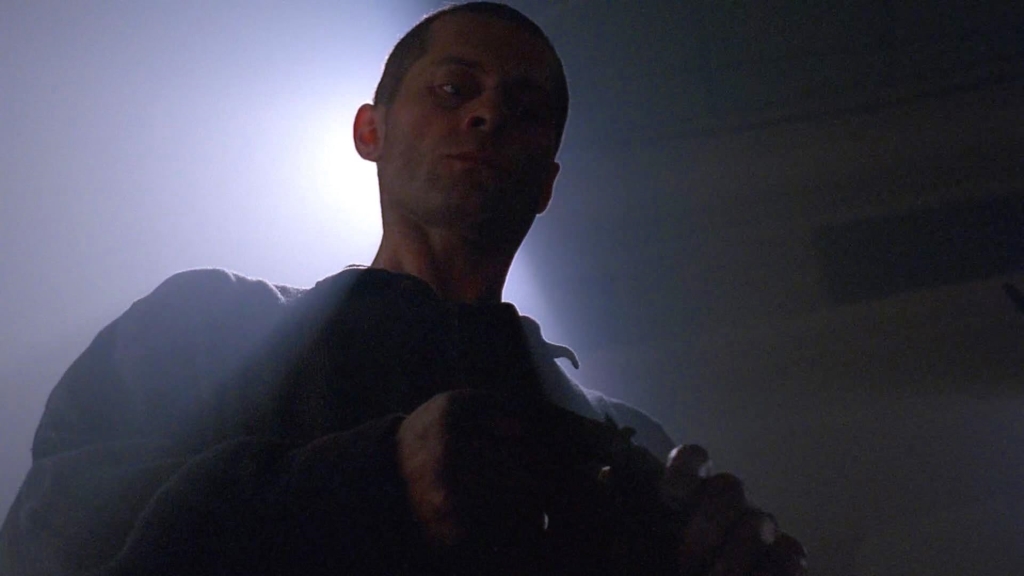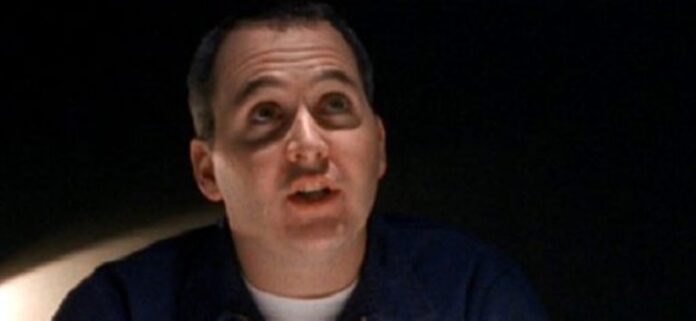Dr. Blockhead, in ‘Humbug’ —
I’m sure he was a nice guy, et cetera, et cetera. But as an admirer of this man’s work, I am in a position to perform an impromptu tribute in his honor. Namely, ramming this spike into my chest!
We’re over a decade beyond the final episode of The X-Files, and comprehending its legacy remains challenging.
Undoubtedly, it’s a well-received and well-remembered show, as evidenced by its recent induction into the TWTV Hall of Fame.
Nevertheless, even the show’s most enthusiastic supporters, and, in fact, especially its most devoted fans, would acknowledge its profound flaws.
While its extensive mythology may have influenced the structure of long-running plots in subsequent television shows, it also stands as a cautionary tale, as that very mythology eventually collapsed under its own weight long before The X-Files reached its conclusion.
Many episodes revolved around the opposing worldviews of its central characters—Fox Mulder, the credulous believer, and Dana Scully, the rigorous skeptic.
However, the truth would so frequently lean toward the supernatural that Scully’s skepticism eventually seemed more like stubbornness than proper scientific rigor.
One aspect that is beyond dispute is the exceptional talent of the show’s writing staff.
Throughout nine seasons, Chris Carter assembled one of the most extraordinarily gifted groups of television writers ever to collaborate.
Writers such as Howard Gordon and Alex Gansa (Homeland), Tim Minear (Firefly), Jeffrey Bell (Angel), and Vince Gilligan (Breaking Bad), among other luminaries, contributed multiple episodes.
The presence of such a deep and talented roster is remarkable, but what’s even more impressive is that the best among them wrote only a handful of scripts and then moved on, leaving an indelible mark on the series.
It’s also noteworthy that he initially appeared on the show dressed as a humanoid flukeworm.
Darin Morgan’s first involvement in The X-Files was as an actor, portraying the mutated antagonist in the gruesome second-season episode “The Host.”
His brother, Glen, was already a writer and executive producer on the show.
After Darin endured the grueling experience of wearing a full-body costume for extended hours, he was offered the chance to write for the series.
His debut episode, “Blood,” earned him a story credit, but his work was compelling enough to secure him a permanent position on the writing team.
In his first solo endeavor, “Humbug,” Morgan revolutionized The X-Files.
One of the most enduring qualities of The X-Files is its remarkably flexible approach to tone: some episodes are dark, some are unsettling, some are terrifying, some are melancholic, and some are humorous.
Revisiting the first two seasons, it’s striking how initially somber the show is.
While there are occasional moments of humor, primarily delivered through Mulder and Scully’s deadpan snark, the overall tone remains relentlessly bleak.
In the early episodes, it seemed as if the series feared veering into campiness, occasionally overcompensating and coming across as rigid and overly serious.

An example of this can be found in the lamentable first-season episode “Space,” which features a concept so inherently laughable that the show’s unwavering commitment to treating it gravely only exacerbates its problems.
Despite its early excellence, most of the time, the scripts were as devoid of light as the cinematography.
However, “Humbug” brought something entirely different to the table—a joyous disruption of the status quo.
The plot adheres to the classic X-Files formula: a supernatural entity is systematically killing the inhabitants of a small town.
Yet, Morgan’s ensemble of characters finally pulls back the curtain on the machinery and suggests, “Hey, this is all quite absurd, isn’t it?”
The small town in question consists entirely of former circus sideshow performers who refuse to conform to the typical X-Files narrative.
This whimsical script slyly winks at the audience, adhering to the same rules and rhythms as previous episodes but also gleefully pulling the whole affair into the light.
By the episode’s conclusion, the series has thoroughly deflated itself, discovering its capacity to mock its own seriousness.
However, crucially, “Humbug” isn’t merely a playful exercise—despite its humorous tone, Morgan infuses the story with genuine significance.
It goes beyond comedy and delves into deeper themes about individuality and the importance of heeding voices challenging the status quo.
There is a depth and substance to these themes that prevent the episode from being a mere throwaway comedy.
Following “Humbug,” Darin Morgan contributed just three more credits to The X-Files, all in the third season, and they continue to be cherished by fans.
He secured an Emmy for “Clyde Bruckman’s Final Repose,” an outstanding exploration of character, delving into themes of death and existentialism.
“War of the Coprophages,” perhaps Morgan’s most overtly comedic script, examines the downsides of conventional wisdom and the perils of mass hysteria.
His concluding X-Files installment, “Jose Chung’s From Outer Space,” stands as one of the most remarkable teleplays ever crafted, deliberately weaving a complex narrative that dissects the very core themes upon which the series was founded, dismantling them one by one.
These episodes are brimming with humor, yet, akin to “Humbug,” Morgan doesn’t merely rely on humor alone.
He steers clear of the easily clichéd territory of excessive meta humor and breaking the fourth wall, with the exception of a few sly nods to star David Duchovny’s triumphant appearance on Jeopardy! and a brilliantly executed visual gag in “Coprophages,” where an animated roach seemingly crawls across the viewers’ television screens.
While he undoubtedly elicits laughter, he maintains a relatively serious tone.
This approach works to his advantage, as Morgan satirizes the series itself, which was always incisive and uncompromising.
Recognizing the show’s tendency to vindicate Mulder’s supernatural convictions, Morgan’s episodes consistently depict the agent as a self-absorbed buffoon, a perilous madman, and a “ticking time bomb of insanity” hurtling toward complete mental collapse in just a few years.
While Mulder possesses a quick wit, the characters in “Humbug” and “Clyde Bruckman” consistently outmaneuver him, leaving him searching for retorts.
In “From Outer Space,” Morgan dedicates an hour to arguing that not only can Mulder never attain the truth he pursues, but that truth, in fact, is elusive.
Morgan’s portrayal of Mulder depicts him as a man embarking on an endless quest destined to culminate in shame, desolation, and the potential for psychosis.
Considering Mulder’s role as the apparent hero character, the one the audience primarily identifies with, this scathing critique is quite surprising.
Morgan manages to pull it off, primarily because his episodes excel and because much of this critique is subtly woven into the narrative, particularly when juxtaposed with the other X-Files episodes.
The following week, Mulder would return to his pursuit of spectral serial killers, and everything would return to its usual state.
Following “Jose Chung’s From Outer Space” near the end of season three, Morgan departed from the series.
He made a cameo appearance as an actor in the fourth-season gem “Small Potatoes,” portraying a nerdy shapeshifter who ingeniously assumes Mulder’s identity briefly. However, he never authored another X-Files script. Nevertheless, his influence resonated widely throughout the remainder of the series.
Inspired by Morgan’s approach, the other writers soon realized that it was acceptable, from time to time, to inject humor into their characters.
It didn’t consistently hit the mark; in the third year, Chris Carter attempted a “satire” titled “Syzygy,” which fell flat, largely due to its lack of the profound thematic insights found in Darin’s scripts.
However, by the fourth season, the writing team, particularly Vince Gilligan, the writer of “Small Potatoes” and Morgan’s spiritual successor, fully embraced the comedy episode as a valuable addition to The X-Files arsenal.
By the sixth season, the humorous episodes nearly outnumbered the serious ones.
During a stretch of six consecutive hours, five of them could arguably be categorized as “comedy” episodes, and this even includes a two-part storyline.
Did all of these comedy scripts achieve the same level of success as Darin Morgan’s? Not quite.
As mentioned, Carter’s “Syzygy” fell short, and he later became fixated on churning out quirky, offbeat episodes for himself to direct.
Towards the series’ conclusion, when the overarching mythology had grown so convoluted and uninteresting that even the writers appeared disinterested, Carter could be counted on to deliver at least one shameless gimmick episode annually.
Some writers found it easier to tread this path: Gilligan’s high-concept comedy episodes also shone in the series, especially the Rashomon-style “Bad Blood” and the audacious “X-Cops,” where Mulder and Scully found themselves unwillingly featured on COPS.
Nevertheless, none quite managed to capture the exquisite fusion of humor and insight, laughter and poetry, that Morgan achieved during his brief tenure on the show.
In the closing moments of “Jose Chung’s From Outer Space,” Mulder implores the eponymous Chung, a best-selling novelist, not to proceed with his plan to publish a book based on one of Mulder and Scully’s investigations.
He fears that it will cast a negative light on the field of ufology, portraying believers as gullible.
However, Chung stands firm, publishes his book, and exposes Mulder’s quest for truth as a futile endeavor.
The question of whether we are alone in the universe is rendered moot because, as Chung eloquently states, “We are all, in our own ways, on this planet, alone.”
Chung didn’t aim to mock Mulder; he gazed into the abyss at the core of Mulder’s quest and found only darkness, prompting laughter.
In this manner, Morgan’s legacy mirrors the complexity of the show itself.
He undeniably demonstrated that the series could transcend being just a weekly fright-fest, paving the way for The X-Files to evolve into the versatile form it would assume in its classic years.
However, he accomplished this by deconstructing the very show he was contributing to, while setting an impossibly high standard that no one else seemed capable of surpassing.
If Morgan had stayed on for another season, it’s possible that the novelty might have worn off, and he might have delivered a comedy script that fell flat.
But after coming as close to perfection as possible with the zany “From Outer Space,” he departed, leaving an indelible mark on the series.
I can’t think of another show where a writer with such a brief tenure had such a profound impact—where, with just a few writing credits, a writer supplied a good show with the missing tool in its toolbox to transform into greatness.
Darin Morgan taught The X-Files how to embrace humor.


